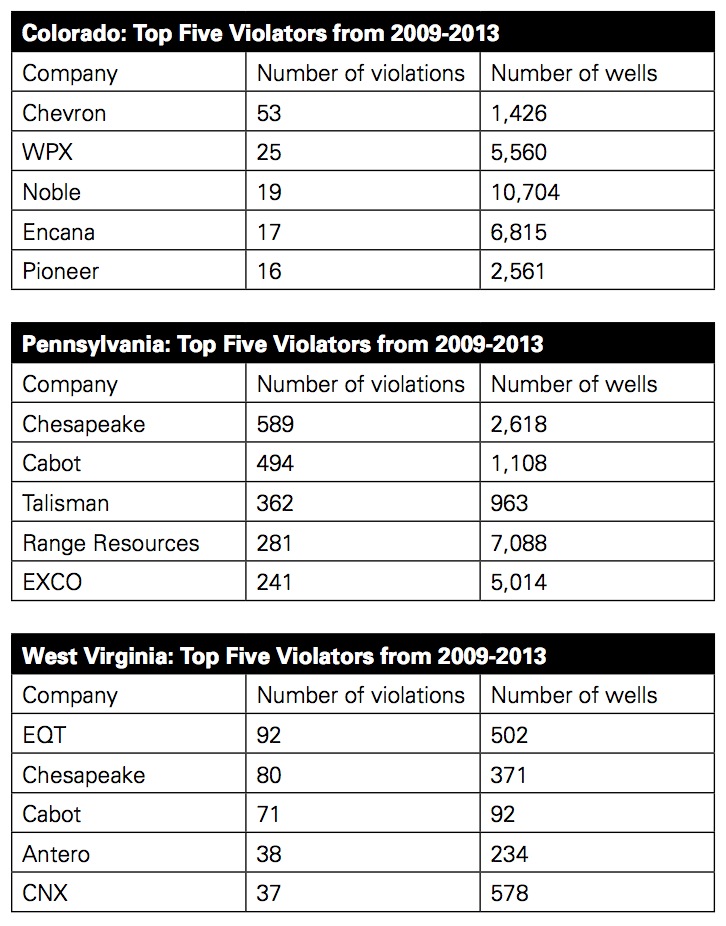NATURAL RESOURCES DEFENSE COUNCIL
Introduction
Hydraulic fracturing, also known as fracking, is an intensive industrial process used to extract oil and gas, and typically involves millions of gallons of water mixed with dangerous chemicals. The result: toxic waste, air pollution, thousands of truck trips, excessive noise and other impacts to humans and wildlife. Too often, this dirty industrial process is—literally—in the backyards of families across America.
Communities want to know whether a company interested in fracking in their neighborhoods is a good corporate citizen that abides by the rules established to protect public health and safety, the environment, and quality of life. A credible measure of a company’s compliance lies in the documented violations incurred from state or federal regulatory agencies. Public access to this information is particularly important in this context because, unlike other industries, oil and gas wells and associated infrastructure and equipment are widespread and often operate in the middle of residential, rural, and agricultural areas.
Sadly, in most of the United States, neither state nor federal agencies are providing information on violations in a transparent, easily accessible, or comprehensive way. Corporations aren’t providing this information either. The Global Reporting Initiative (GRI)—an international nonprofit organization governed by stakeholders from industry, government, labor, and non-governmental organizations—promotes sustainability reporting to measure impacts and performance. GRI guidelines recommend that oil and gas companies publicly report significant fines and the total number of non-monetary sanctions for noncompliance with laws and regulations. According to GRI, public disclosure of violations and sanctions “helps indicate the ability of management to ensure that operations conform to certain performance parameters.”
Nevertheless, “hardly any companies are doing such reporting,” according to Richard Liroff of the Investor Environmental Health Network, a collaborative partnership of investment managers. Liroff states: “Reporting on violations provides an important quantitative indicator of how well companies are managing environmental risks.”
Summary
NRDC and the FracTracker Alliance (FTA) launched an investigation to determine what information about oil and gas company violations is publicly available, how accessible it is, and whether it provides an adequate understanding about the practices of different companies. We looked at whether information could easily be found on the internet, rather than having to make official requests for information in writing.
We found that information about the frequency and nature of oil and gas company violations is only publically accessible in three states. Although 36 states have active oil and gas development, most state and federal oil and gas regulatory agencies publish little or no information regarding oil and gas companies’ compliance records.
Yet in states where data are available, we found significant violations both in number and severity. These violations include a wide range of dangerous infractions like improper well casing, illegal air pollution, failure to conduct safety tests, improper construction or maintenance of waste pits, various spills, contamination of drinking water sources or other water bodies, and non-functional blow-out preventers.
 Download full version (PDF): Fracking’s Most Wanted
Download full version (PDF): Fracking’s Most Wanted
About the Natural Resources Defense Council
www.nrdc.org
NRDC is the nation’s most effective environmental action group, combining the grassroots power of 1.4 million members and online activists with the courtroom clout and expertise of nearly 500 lawyers, scientists and other professionals.
Tags: Fracking, FracTracker Alliance, FTA, Hydraulic Fracturing, Natural Resources Defense Council, NRDS






 RSS Feed
RSS Feed